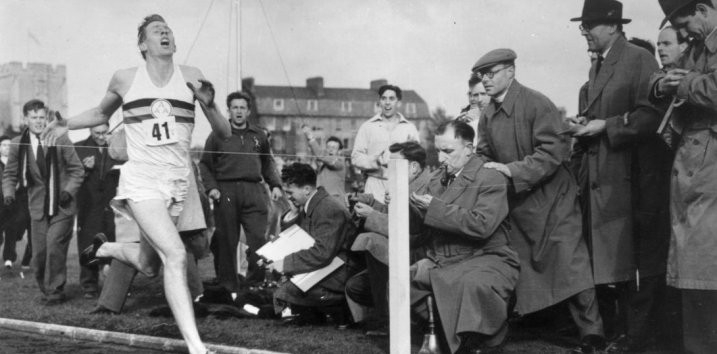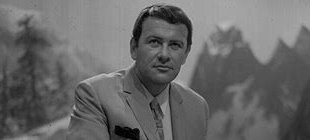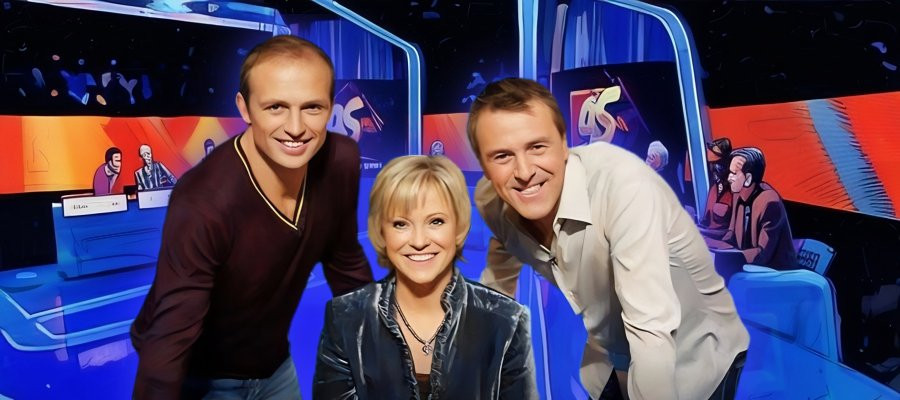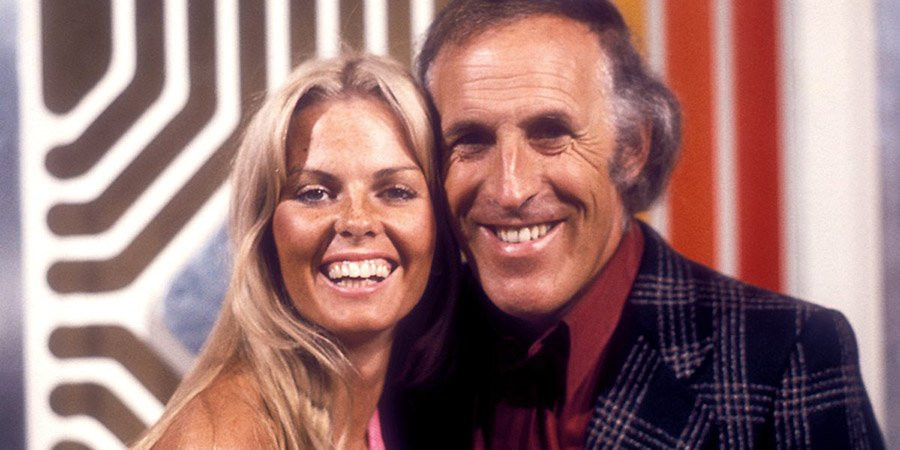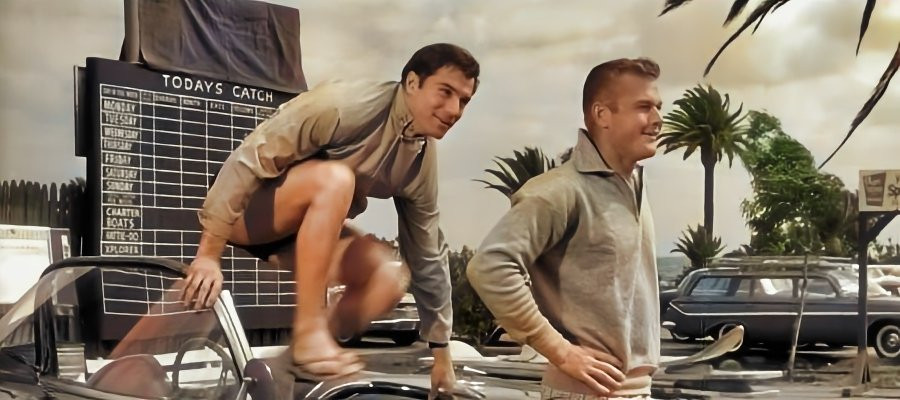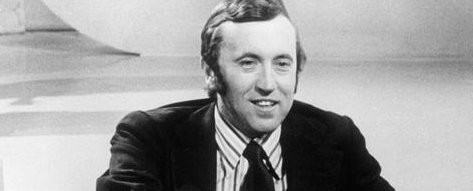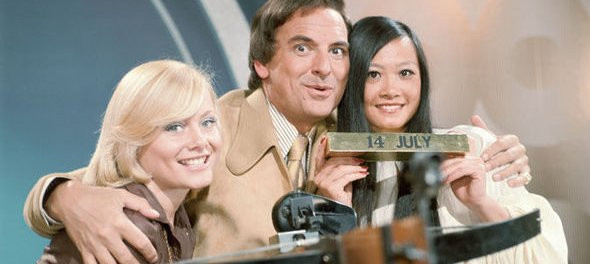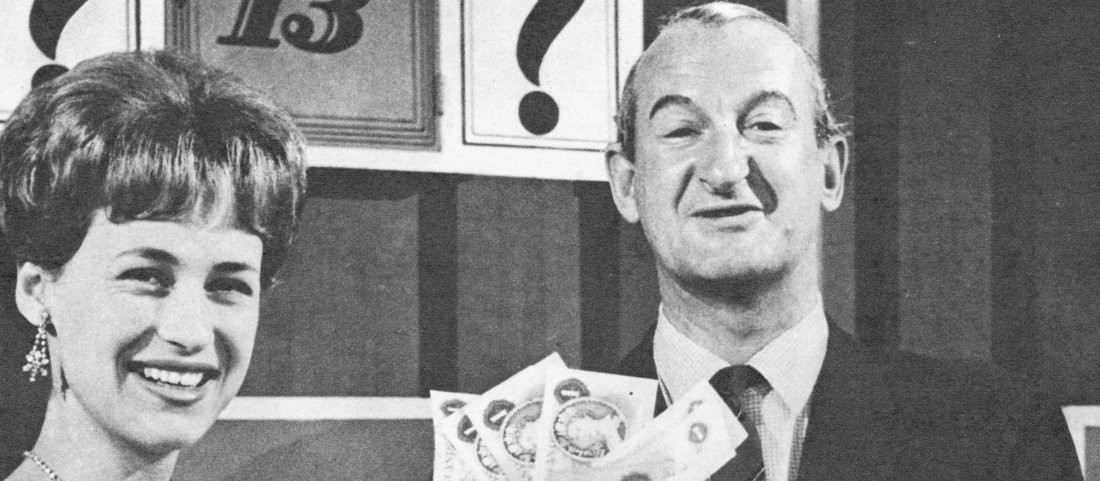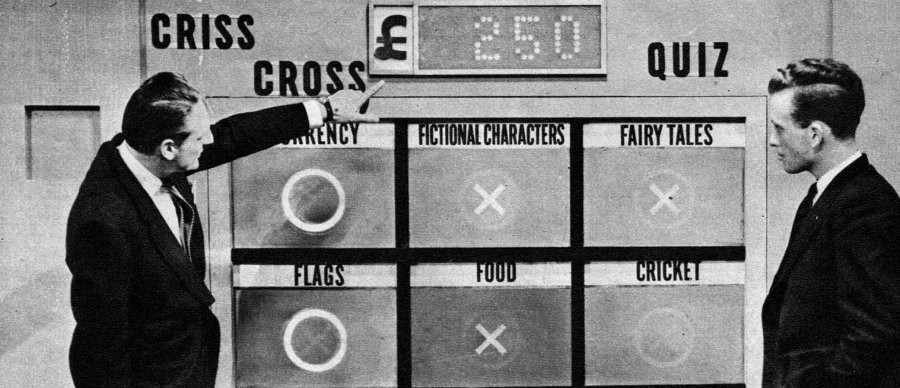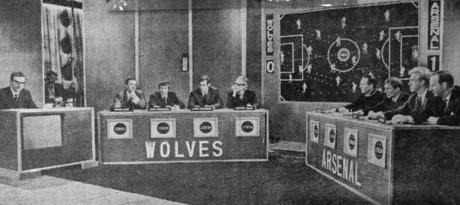
Quizball!
1966 - United KingdomReview: Paul Caulfield
For football fans of the 60s and early 70s, Quizball!, the BBC’s football-based general knowledge quiz was like a new toy. Featuring teams of celebrities and players, it offered punters a chance to see the country's best in off-duty mode.
The exclamation mark in the title suggested something slightly more gripping than the audience experienced; the be-suited managers and players giving the show a slightly stuffy air. But with Quizball! arriving almost in tandem with colour TV, young viewers, bedazzled by the authentic-looking pitch and appearance of real-life footballing heroes, were less concerned with entertainment or sartorials. Through eight year old eyes, Quizball! was cutting edge. These days, like all things Seventies, it looks less so.
Goals in Quizball! were scored through correct answers to general knowledge questions, with four routes to goal. ‘Route One’ was the quickest, but with the difficulty of the question the hardest, and soon became hackneyed shorthand for a punt down the middle. Routes two to four, for a flowing back to front move were easier, but gave the opposition the chance of a tackle question to win possession. Whether it was a reducer is not recorded, though a missed tackle, in the form of a wrong answer meant a goal to the opposition. Teams who took more time on the ball had more chance of losing it, just as they did on a Saturday.
Quizball! has been all but forgotten among the viewing public, and its lack of exposure suggests any undiscovered recordings could be gathering dust next to unrepeatable episodes of the The Goodies. The tapes, or lack of them, are a sore point for enthusiasts. While snatches of footage are still on Youtube, the BBC has no full Quizball! episodes, after the Corporation disposed of video records, citing cost and lack of space. Though with the option of DVD and online records - neither exactly bulky - this argument is spurious at best.
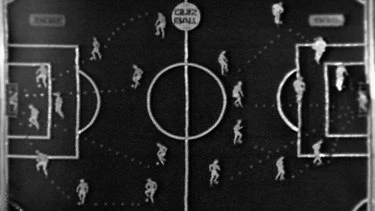
In an online interview, BBC Archivist Adam Lee said; "The areas where we tend to be more selective would be, for example, in a long-running quiz show, where it's really important to have examples of that, but we wouldn't necessarily keep them all for ever............that's a big overhead to have." Lee said that material was offered to BFI before disposal; 'they take a reasonable selection of material they want', though as the BFI confirmed, this didn't extend to Quizball!
"At the moment," said Lee, "everything is recorded and everything is kept for a minimum of five years. We keep the very expensive programmes, the news, the current affairs. The areas where we tend to be more selective would be, for example, in a long-running quiz show." Which isn't surprising. In prestige terms, Coleman and Vine stood little chance against the twin strikeforce of George Eliot and Jane Austen. And Quizball! was in good company, as sheer thoughtlessness saw it joined in the dustbin by priceless recordings of Hancock's Half Hour and Dr Who.
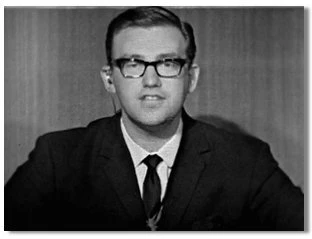
In some ways, Quizball! was a studio-bound forerunner of the Anglo-Scottish Cup, with teams drawn from both sides of the border. The Old Firm were left out to start with - reflecting the fleeting prominence of provincial Scottish clubs in the mid 60s. Celtic took the trophy in 1968, while in '69, a goal from one Alex Ferguson put Falkirk in the semi-finals, where they lost to Everton. The first episodes were broadcast live - a situation best suited to the guests - and presented by David Vine in grainy black and white. The presenter, complete with Harry Palmer specs, cut a studious figure in front of a ‘pitch’ that resembled a blackboard with lights, while the signature tune was a typically catchy 60s/70s effort, oddly reminiscent of the Benny Hill theme. An attraction for the traditionalist was an insistence on extra time to settle drawn ties, with shootouts considered outlandish even for a quiz show. Crystal Palace prevailed this way in 1970-71, beating Leeds in the semis before succumbing 4-2 to Derby in the final. Richard Wattis of Sykes and Hancock fame, scored twice for the Glaziers, as they were then.
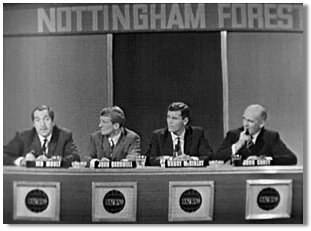
Other high profile guests included Reading supporter John Arlott, Dad’s Army, (and RSC) veteran, John 'we're doomed' Laurie (Dundee 1969-70) and Kenneth Cope, the ghostly presence from Randall and Hopkirk who turned out for Everton. Meanwhile, seven of Leicester’s nine goals in the 1966 series were scored by guest fan and What’s My Line veteran Lady Isobel Barnett, including a nap hand in the 5-0 romp against Sheffield United in round 2. Derbyshire farmer - and former Brain of Britain contestant - Ted Moult did even better. The future face of Everest double-glazing claimed 11 of Nottingham Forest’s 12 goals in 1967-68, including one in the final against another one-man team, West Brom - John Osbourne the man in question. Gerry Queen scored all Kilmarnock’s goals in 1967 and was in the Crystal Palace quartet after his move South. It isn't known whether Bert Head signed him for his footballing ability or outstanding general knowledge, but managers appreciated Quizball's profile, and queued up to appear. Other guv’nors on the guest list included Brian Clough in his Derby days and Harry Catterick, then nurturing Everton’s title-winners.
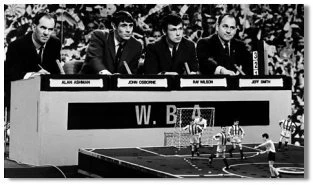
Dressing room culture bubbled up occasionally, and judging by their reaction, Bob Wilson’s team-mates had him down as a dangerous intellectual for knowing what ‘RSVP’ meant. For their part, the managers probably saw Quizball! as an interesting night out, or an opportunity to chaperone some potentially wayward charges. And with Arsenal mid-way through a 17 year trophy drought, the 7-3 win over Dunfermline in the 1966 final was a welcome distraction, though few will remember the victory itself or could name the players wheeled out to secure it. Alan Mullery and Terry Venables appeared for Spurs in the first series, while there were some fine performances from ex-West Ham centre half John Cushley in the winning Dunfermline quartet of 71-72. With his academic and teaching background, Cushley would have been first on the teamsheet. It was his hat-trick that propelled the Pars (including celebrity team member Jon Pertwee) to victory over Leicester on 23rd December 1972, in the last edition of the show's six year run.
Quizball! was great for those fluent in football-speak, but less so for the general audience. From January 1970, it faced serious competition from the family-friendly Question of Sport (QoS) whose twin attractions of casual knitwear and Cliff Morgan proved irresistible. After Quizball's buttoned-up seriousness, the QoS emphasis on entertainment was refreshing, with the humour more leg-pull than ankle-tap. Question of Sport went on to atract 8 million viewers in the 80s, and did to Quizball! what glorified comedy show They Think It's All Over (TTIAO) failed to do in the 90s; consign its more established rival to the archives.
Traces of TTIAO can be seen in the James Corden-hosted A League of their Own, where points come a poor second to punditry. The success of the show - which started with 500,000 viewers and will run until 2019 at least - suggests present-day viewers without a grasp of sporting trivia just want to be entertained as they flop into the armchairs.
With blanket coverage and media sensitivity, it is doubtful today’s top players and managers would appear in Quizball! today. But 40 years ago, with football exposure strictly limited, an appearance on prime-time TV was good publicity.
For its part, QoS, Britain's longest running TV quiz, now lacks any serious competition. Its old rival was revived briefly in 1998, but the pilot for a rebooted Quizball! (featuring Frank Skinner), went no further. The show's lingering appeal did attract a Daily Mirror reader offer of memorabilia, though with prices at £10.99 to £67.99 for the range of framed photos, mousemats and mugs, it was one for the diehard fan; a bit like the show itself.
Seen this show? How do you rate it?
Seen this show? How do you rate it?
Published on January 24th, 2019. Written by Paul Caulfield (March 2016) for Television Heaven.


